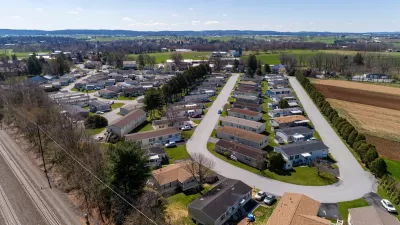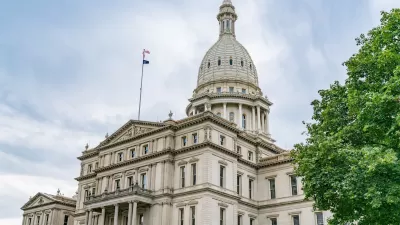Rural residents often have a harder time accessing legal assistance and eviction prevention resources.

Eviction notices are putting many rural renters in a precarious housing situation, reports Jaime Adame for The Daily Yonder.
According to Adame, who lives in a small Texas town, “The rise of out-of-state corporate landlords leads to especially burdensome eviction practices in small cities and towns like mine, with rural renters more likely than urban tenants to struggle and lose in court, researchers and tenant advocates say.”
Adame notes that a mobile home park owned by an out-of-state corporation is one of the most frequent filers of evictions in his county. “This fits a national trend observed by Gershenson with Princeton’s Eviction Lab, who said in an email interview that corporate landlords are more likely to file evictions, although the correlation to out-of-state ownership is less clear.”
Adame’s piece highlights the problems with corporate ownership of housing such as mobile home parks, which are a crucial source of affordable housing in many rural (and urban) U.S. communities. Researchers from the Princeton Eviction Lab say rural renters are often more likely to lose eviction cases. “When [rural] renters do receive a filing, they will have more trouble than their counterparts in urban areas, because rural areas have a less developed ecosystem of legal service and tenants’ rights organizations.”
FULL STORY: ‘Churn Kills’: Eviction Threats Strain Already Limited Supply of Rural Rental Property

Maui's Vacation Rental Debate Turns Ugly
Verbal attacks, misinformation campaigns and fistfights plague a high-stakes debate to convert thousands of vacation rentals into long-term housing.

Planetizen Federal Action Tracker
A weekly monitor of how Trump’s orders and actions are impacting planners and planning in America.

San Francisco Suspends Traffic Calming Amidst Record Deaths
Citing “a challenging fiscal landscape,” the city will cease the program on the heels of 42 traffic deaths, including 24 pedestrians.

Defunct Pittsburgh Power Plant to Become Residential Tower
A decommissioned steam heat plant will be redeveloped into almost 100 affordable housing units.

Trump Prompts Restructuring of Transportation Research Board in “Unprecedented Overreach”
The TRB has eliminated more than half of its committees including those focused on climate, equity, and cities.

Amtrak Rolls Out New Orleans to Alabama “Mardi Gras” Train
The new service will operate morning and evening departures between Mobile and New Orleans.
Urban Design for Planners 1: Software Tools
This six-course series explores essential urban design concepts using open source software and equips planners with the tools they need to participate fully in the urban design process.
Planning for Universal Design
Learn the tools for implementing Universal Design in planning regulations.
Heyer Gruel & Associates PA
JM Goldson LLC
Custer County Colorado
City of Camden Redevelopment Agency
City of Astoria
Transportation Research & Education Center (TREC) at Portland State University
Jefferson Parish Government
Camden Redevelopment Agency
City of Claremont





























